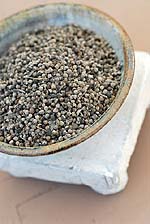Vitex Herb

Two thousand five hundred years ago, the father of natural medicine,
Hippocrates, discovered that small berries of a shrubby plant native to
Greece and the Mediterranean were an effective remedy to regulate the
woman's monthly cycle and to help new mothers produce an ample supply
of breast milk. Its use for gynecological conditions is also noted in
the works of Pliny (A.D. 23-79): "The trees furnish medicines that
promote urine and menstruation."
During the past forty years, research has focused on the use of vitex
for premenstrual syndrome (PMS) and menstrual difficulties. A 1992 survey
of German gynecologists evaluated the effect of a vitex preparation on
1,542 women diagnosed with PMS. Both physicians and patients assessed
effectiveness, with 90 percent reporting relief of symptoms after treatment
averaging 25.3 days.
In one clinical drug-monitoring study on the effectiveness and safety
of long-term treatment with a vitex fruit tincture, 1,571 women with menstrual
disorders and PMS were followed for a period of seven days to six years
(average 147.6 days). In 90 percent of patients, the treatment eliminated
or alleviated symptoms of PMS.
Vitex contains several different constituents, including flavonoids,
iridoid glycosides, and terpenoids. The whole fruit extract, rather than
one of its individual constituents, appears to be necessary for the medicinal
activity of vitex.
Use ½ teaspoon of the liquid extract in a little water, first
thing in the morning. This simple remedy can help ease such symptoms as
mood swings, irritability, sugar cravings, acne, excessive menstrual bleeding,
and irregular cycles associated with PMS. During menopause, the remedy
can be used for several months to a year, or longer under the guidance
of your herbalist, to make the journey more pleasant.
|